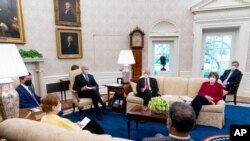“I’m willing to compromise,” U.S. President Joe Biden told a group of bipartisan lawmakers during a Monday Oval Office meeting about his $2 trillion jobs and infrastructure proposal.
“Obviously, I put a lot in the package, and I think it all should be included,” the president told the members of Congress, who all previously served as governors or mayors.
The big question, Biden acknowledged, is “how to pay for it.”
Monday’s meeting was the second time the president has hosted a group of Democratic and Republican lawmakers together in hopes of crafting legislation on U.S. infrastructure that could be supported on both sides of the aisles in the House and Senate.
"The members of Congress engaged in a productive exchange of ideas, including components of the plan and how to pay for them," the White House said in a statement following the meeting. "President Biden asked for their feedback and follow-up on proposals discussed in the meeting, while underscoring that inaction is not an option."
Some Republicans criticize the president’s American Jobs Plan as too expensive and too broad, going way beyond the traditional definition of infrastructure. Opposition lawmakers are also generally opposed to raising corporate taxes from 21% to 28%, as Biden desires.
While Biden’s $2 trillion proposal, which is short on specifics, would fund roads and bridges, it also includes projects to mitigate climate change and expand access to home and community-based care.
The president faces pressure from the Republicans but also from the progressive wing of his own Democratic Party, which feels some of Biden’s proposals do not go far enough.
Some analysts see the initial infrastructure-improvement and jobs-creating legislation being whittled down to as little as $800 billion if a bipartisan compromise is reached.
White House press secretary Jen Psaki made clear again Monday, just before the Oval Office meeting, that the Biden administration is flexible and that everything does not need to be included in one big initial package.
“The president's bottom line here is that the only thing we cannot do is fail to invest in our nation's infrastructure, rebuild our economy and create millions of jobs,” Psaki told reporters during the daily press briefing. “That's the only piece he does not want to see us fail to do as a country and fail to do, hopefully, in a bipartisan manner.”
The administration is “quite open to a range of mechanisms for agreed upon legislation moving forward, smaller packages, pieces being peeled off,” Psaki said. “In terms of what the package or size looks like — we're just not quite there yet.”
For compromise to occur "both sides have to want to come to the table,” said Michele Nellenbach, vice president of strategic initiative at the Bipartisan Policy Center.
"You can do this issue by issue,” she said, predicting, despite the differences between the two parties, legislation is likely to be passed, even if it does not occur this year, for funding highways, internet broadband and water projects. "There are elements of this that are going to get through."
The Senate this week is set to consider a $35 billion water infrastructure bill, which enjoys wide bipartisan support but is far short of the amount the president wants to spend. It would help replace aging water pipes and bolster wastewater systems against natural disasters.






